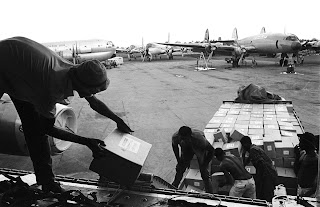Biafrans Capitulate To Nigeria: US Increases Grant For Relief

School children gather at the courtyard reminiscing the effects of the tragic. Image: A. Abbas/Magnum Photos (1971) BY LAWRENCE FELLOWS JANUARY 13, 1970 LAGOS, NIGERIA (THE NEW YORK TIMES) —Biafra, with its last de fenses crumbling and its supplies of food and ammunition exhausted, capitulated yesterday to the Nigerian Government. Brig. Philip Effiong, the Bi afran Chief of Staff, who took over the leadership Saturday night when Gen. Odumegwu Ojukwu fled the besieged remnant of the secessionist region, announced on the Biafran radio this afternoon that the attempt at secession had failed. [Unconfirmed reports from Lusaka, Zambia, said Monday night that General Ojukwu was expected to arrive with in the next day. It was un derstood that Zambia had of fered him asylum. Page 15.] Brigadier Effiong ordered Biafran forces to disengage from battle in an orderly fashion and said that he was sending representatives to Nigerian field commanders to negotiate an armistice. Gowo...

